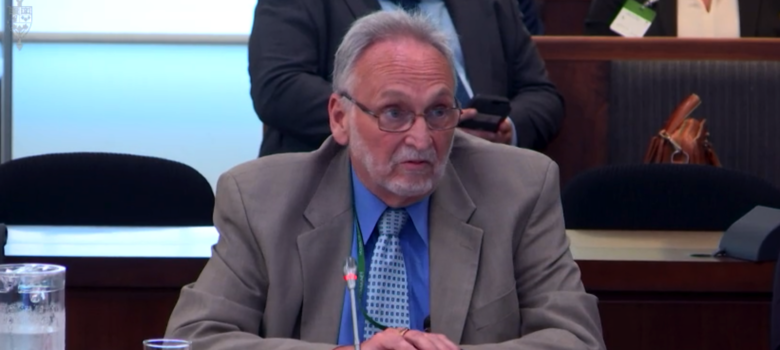The Online Streaming Act hearings at the Canadian Heritage committee continued yesterday with testimony from several notable witnesses, including CRTC Chair Ian Scott. Scott had appeared before the committee several weeks earlier, confirming that Bill C-11 contains a provision that captures user content regulation, acknowledging that “as constructed, there is a provision that would allow us to do it as required.” That statement would not ordinarily be controversial since the inclusion of user content has been readily apparent since the bill was introduced. I’ve argued that Heritage Minister Pablo Rodriguez has engaged in systematic gaslighting with his insistence that user content is not in the bill. My post on the issue walks through the proposed legislation, noting the “CRTC is empowered to create regulations applicable to user content uploaded to social media services as programs” and focusing specifically on the discoverability rules and their implications.
Scott’s appearance was presumably designed to walk back or soften his earlier statement on user content regulation in the bill. And while he was at pains to suggest that the CRTC faced strict limits in its regulatory power, he once again acknowledged the reality:
[Section] 4.2 allows the CRTC to prescribe by regulation user uploaded content subject to very explicit criteria. That is also in the Act.
The discussion later focused on what powers the CRTC has with respect to user content. Commission general counsel Rachelle Frenette pointed to discoverability and accessibility as a couple of examples, but tried to downplay the impact, noting that the regulation would be applied to platforms, rather than users themselves.
Yet that is entirely consistent with the concerns of digital creators, namely that platforms will be required to develop outcomes that result in some content being prioritized in the name of discoverability. Indeed, Frenette might have gone further by noting that the bill actually gives the CRTC the power to develop regulations on user content involving “the presentation of programs and programming services for selection by the public.” That could certainly extend beyond just discoverability or accessibility. Moreover, there was further discussion on how algorithm regulation is out of the bill, with the Commission emphasizing that it regulates outcomes, which (as I noted in my very first post on the bill) in the context of user content is a distinction without a difference.
At this stage, there is simply no debate over whether user content is included in the Online Streaming Act. The CRTC Chair has now confirmed twice before committee that it is. Yet despite this reality, Rodriguez continues to gaslight this week in the House of Commons, claiming “platforms are in, but users are out.” Yet the Minister surely knows this is misleading. The concern that has been raised for over a year dating back to Bill C-10 was the regulation of user content, something that the CRTC chair has now confirmed on multiple occasions.
When the government isn’t misleading about the scope of the bill, it would seemingly prefer to shift the debate to the implications of CRTC regulatory power on user content, with Scott seeking to portray it as harmless. However, those who are expert in the area have identified risks to Canadian creators with the approach, particularly with respect to content downgraded in algorithms outside of Canada. The CRTC doesn’t have to regulate the specific algorithm to accomplish this, since it need only require platforms such as Youtube and Tiktok to prioritize certain Canadian content in the “presentation of programs for selection by the public.” As Canada’s most successful digital streamers have told the committee, this could have a devastating effect on their businesses and the export of Canadian culture.
If the government is right – that its intent is to exclude user content and the provision is in any event harmless – there seems to be little compelling reason to keep it in the bill. To do otherwise, is to tell thousands of Canadian digital creators that their concerns are invalid and their voices don’t matter. The right approach that responds to the concerns of numerous witnesses and associations is simply to remove user content from Bill C-11 and return the focus to the large curated streaming services such as Netflix and Disney.









I do wish someone would focus on the fact that the economic impact of this Bill on consumers, media producers and streaming companies cannot be done because most of the major rules will not be known until the Policy Directive is issued.
Pingback: Canada’s broadcasting regulator confirms proposed online censorship bill will apply to user-generated content – OasisNews
Pingback: Canada’s broadcasting regulator confirms proposed online censorship bill will apply to user-generated content | Libertarian Hub
Pingback: Canada’s broadcasting regulator confirms proposed online censorship bill will apply to user-generated content – AMDaley News
Pingback: Bill C-11 Enters a Danger Zone: Government Shifts from Ignoring Witnesses on User Content Regulation to Dismissing Criticisms as “Misinformation” - E Point Perfect